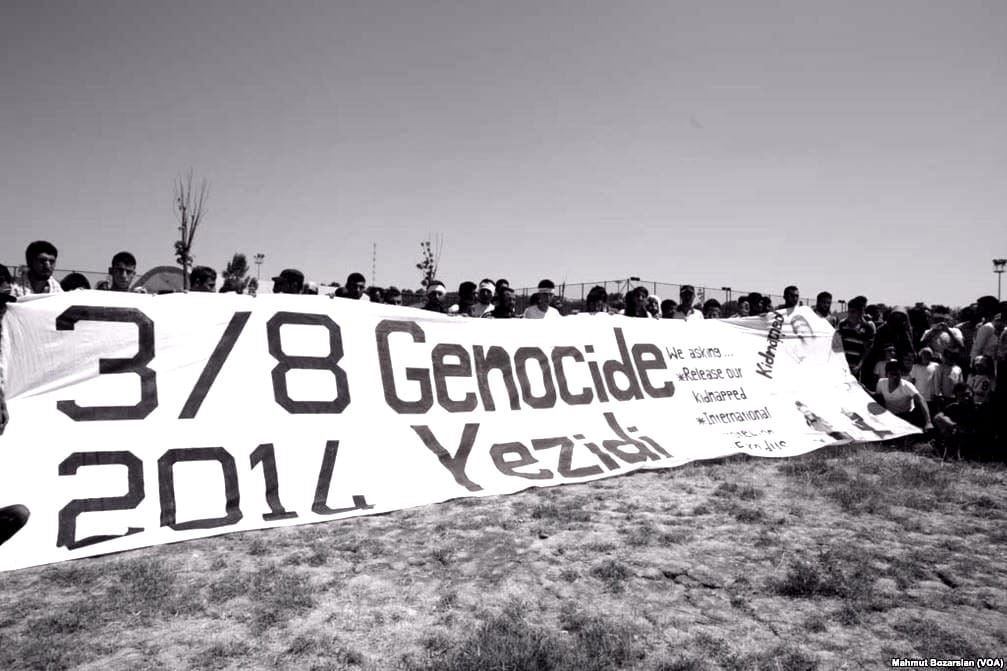On 3 August 2014, the Islamic State (IS) attacked the Yazidi community in Iraq’s Nineveh Province, Sinjar region, resulting in mass killings and enslavement of at least 12,000 Yazidis. The IS crimes against Yazidis and other ethnic minorities were widely recognised as constituting crimes of genocide in accordance with Article 2, 1948 Geneva Genocide Convention and as crimes against humanity and war crimes in line with Article 7(1) and Article 8, Rome Statue. As of March 2025, there have been only 10 prosecutions for crimes against humanity and genocide relative to the Yazidis case, mostly in European courts. Whereas in 2022 – eight years after the 3 August attack and five years after the territorial defeat of IS in Iraq – around 200,000 Yazidis were still internally displaced across the semi-autonomous Kurdistan region (KRI) of Iraq and in neighbouring countries, while at least 2,700 women and children remained missing or in IS captivity.
With the UNITAD mandate expiring on 17 September 2024 and the UNAMI mandate set to expire on 31 December 2025, an assessment of the responses to the Yazidi genocide is long overdue. As shown by the large numbers of internally displaced Yazidis, and minimal success with prosecutions for crimes against humanity and genocide, it appears that neither national nor international efforts aimed at providing justice to the Yazidi community were able to deliver a comprehensive transitional justice framework that would adequately address the needs of the community. Hence, this article discusses to which extent the main needs identified by the Yazidi community – justice, security, and reparations – were addressed on national and international levels, placing emphasis on shortcomings of the implementation of the Yazidi Survivors’ Law (YSL) in Iraq and controversial results of the six years of the UNITAD’s presence in the country.
The Yazidis are the second largest ethnic minority in Iraq after Christians, with an estimated around 550,000 people, mostly residing in northwest Iraq and the KRI’s Duhok Governorate. Religious violence against the community can be traced back to the Ottoman Empire and Saddam Hussen’s Arabisation campaigns. In this context, the 2014 IS attack is referenced in Yazidi tradition as the 74th genocide act against the community. Considering this interpretation and the decades long history of violence against the community, the feelings of abandonment, alienation and marginalisation are deeply engraved into the Yazidis’ identity. In turn, this sentiment must be taken into consideration both while discussing the shortcomings of the political efforts already made to address crimes committed by IS against the Yazidis as well as while advocating for a more comprehensive transitional justice framework.
On a basic level, the key distinctive aspect of transitional justice is the recognition that the problems arising from systematic abuse are too complex to be solved by solely judicial measures. It seeks to address the needs and demands of victims through the five main pillars: criminal justice, truth commissions, reparation programmes, security system reform and memorialisation efforts. As mentioned above, the interviews conducted with the representative of the Yazidi community both shortly after the IS attacks and during the following decade, identified three fundamental needs in line with this framework, namely justice, security and reparations. It is worth noting that while these were first identified between 2016 and 2017, they still remain relevant in 2025.
Responses to the Yazidi genocide
After IS territorial defeat in Iraq in 2017, several national and international initiatives were launched to address the issue of missing Yazidis. These can be divided into three levels: local, national and transnational, which were represented by such actors as Yazidi-led grassroots organisations, the Martyrs Foundation, and the UNITAD, respectively. Despite the comprehensive network of actors on paper, minimal results after a decade of alleged national and international commitment to deliver justice to the Yazidi community show that the response was inadequate and remained at the surface level.
Firstly, no comprehensive database on the number of the missing Yazidis was set in place. Although several attempts to compile a list were made, the data was either incomplete or stored without an adequate legal consideration for the protection of the victims. Secondly, no coordination mechanism relative to either the missing persons issue or judicial system standardisation was achieved or implemented to regulate interactions between local, national and transnational actors. Furthermore, neither Baghdad nor KRI established a comprehensive programme to support the victims and their families. Similarly, due to administrative competition over the Sinjar region, neither the KRI nor Baghdad facilitated rebuilding efforts to provide the returning Yazidis with functional public services and adequate shelter. Despite the fact that the investigations into crimes against Yazidis are still ongoing, the majority of rescue missions have been reportedly conducted by the family members themselves by the means of paying ransom or hiring smugglers to kidnap their family members back.
Thirdly, the UNITAD itself was heavily criticised by the international community due to the minimal amount of prosecutions resulting from its data collection. On the one hand, the Iraqi government failed to meet the international requirements for evidence sharing (e.g. death penalty abolition), limiting the UNITAD’s capacity to transfer collected data for domestic court usage. On the other hand, the UNITAD neither provided the Iraqi authorities with a comprehensive roadmap for the use of collected evidence, nor finalised excavation[1] of mass graves or completed its investigations. Hence, the accumulated 52 terabytes of evidence was not fully used by either side.
Nonetheless, there was one important development at the national level – the passing of the YSL in 2021, which recognises the crimes committed against Yazidis and other ethnic minorities as genocide and crimes against humanity. Under the YSL, Yazidis are entitled to receive a housing unit and a monthly financial compensation (~600$). This sum would not be merely enough to either rebuild a house or survive amid lacking state service provision in the region, worsened by the administrative competition between Baghdad and Erbil. Likewise, Baghdad introduced new rules that required applicants to file a judicial complaint to be eligible for reparation. The very requirement to describe endured abuse in court without any preceding training put survivors at risk of re-traumatisation. Concurrently, several individuals reported to have faced harassment and stigmatisation when they revealed their Yazidi identities during the process of complaint filling. For those displaced or residing outside Iraq, it has been either financially or psychologically challenging to make a claim in person.
On the domestic justice provision side, 2024 marked the first two cases of IS members conviction for committing genocide with subsequent death sentences. Instead, thousands of IS members were prosecuted under the Iraqi Anti-terrorism law but without formal recognition of the act of genocide. In turn, this does not allow for effective justice provision to the Yazidi community, since the violence they endured has continuously not been recognised on a judicial level.
Looking forward/Recommendations/Suggestions
This article highlighted the disparity between the declared commitments of governments and international organisations to deliver justice to the Yazidi community, and the factual lack of results in addressing their key needs. These shortcomings could have been avoided if a comprehensive survivor-centred approach was implemented concurrently with the political and legal efforts under the transitional justice framework. In turn, any attempt to achieve justice without incorporating a sensitivity to the insecurities faced by the community, will continue to be detached from Yazidi’s reality and thus will not provide any meaningful results.
Likewise, several suggestions can be made to address specific challenges in justice provision discussed in the previous section. On national level, the Iraqi government needs to pass legislation incorporating genocide, war crimes and crimes against humanity into its domestic law. In 2021, the KRI administration already attempted to establish a Special Criminal Court for ISIS Crimes, but the Iraq Supreme Court deemed this move unconstitutional. At this rate, Baghdad will remain unable to prosecute IS members under international standards, thus not addressing one of the key wishes among the survivors. With the reported hate speech and misinformation against the Yazidis, the revision of the implementation of the witness protection mechanism is also urgently required.
On an international level, the UNITAD needs to preserve evidence that has not been shared with the Iraqi government and make it available for any relevant court in the world, with an emphasis on the informed consent of sources. To ensure that the information could be used in future trials, an enhanced archiving facility within the United Nations needs to be established. This would at least help to overcome the legal deadlock and prevent the evidence collected over the last decade from drowning in political games.
Moving forward, the focus should be placed on a comprehensive survivor-centered approach that would address persisting feelings of abandonment, marginalization, and injustice among the Yazidi community. Moreover, the provision of financial compensation under the YSL should be seen only as a starting point. What needs to be addressed next are security and insecurity drivers that led to violence in the first place and those currently exacerbating human insecurity in Iraq. A good example of such would be a revision of the Sinjar agreement which was signed without the inclusion of the Yazidi community. Additionally, some of the Yazidis are held in detention facilities in northeast Syria, such as al-Hol and al-Roj camps, which further exacerbates the feelings of abandonment and dismissal. Given the government change in Syria in December 2024 and the recent agreement between Damascus and the Syrian Democratic Forces (SDF), it remains to be seen how this might affect the management of the camps and the repatriation of the Yazidis remaining in detention. Finally, an emphasis should be placed on enhancing the public administrative capacity of the Sinjar region, which would facilitate the creation of a safe and secure environment for the returnees.

